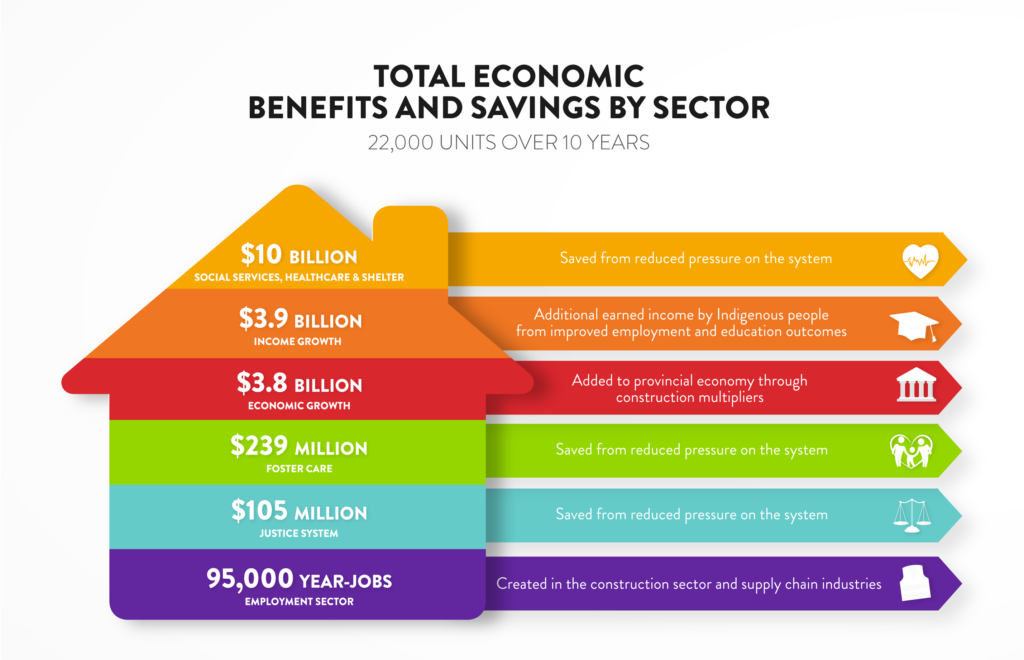Transforming Indigenous community housing in Ontario

Housing is a critical component of Truth and Reconciliation. That’s why ONPHA has launched a plan for Ontario to build at least 22,000 Indigenous owned and operated affordable units over 10 years.
An Urban and Rural Indigenous Housing Implementation Plan for Ontario is a first-of-its-kind for our province. It’s a blueprint for government, private sector, and non-profit partners to transform the way Indigenous housing is built and delivered in Ontario.
A smart investment
Our Plan not only addresses the disproportionate rates of core housing needs among Indigenous households living off-reserve, it also shows how we can achieve significant cost-savings for Ontario and add $3.8 billion to the economy.
“Our Plan ensures immediate and long-term socioeconomic benefits for both Indigenous communities and Ontario more broadly,” said Marlene Coffey, CEO, ONPHA. “Indigenous members within the community housing sector have already done the hard work to map the needs and develop the strategy. What’s needed now is a commitment from all levels of government to fund the Plan. With economic benefits and cost-savings totaling $14.3 billion, it’s a clear win for everyone.”
Figure 1 below shows the benefits and savings by sector.

For-Indigenous, By-Indigenous
The Plan was developed by an Indigenous-led team and follows a For-Indigenous, By-Indigenous (FIBI) approach. Indigenous housing providers from across Ontario participated in the development of the Plan.
“As experts and leaders in Indigenous housing development, we understand our housing needs in an intimate way and understand current need far exceeds the current pace of development,” said Lorna Lawrence, Executive Director, Miziwe Biik Development Corporation, and member of ONPHA’s Urban and Rural Indigenous Housing Advisory Committee.
“With the majority of Indigenous people living off-reserve and continued overrepresentation within the homeless population, it is imperative that a long-term, results-focused plan be implemented.”
85% of Indigenous people in Ontario live off-reserve, of which 18% are in core housing need (compared to 12% for the non-Indigenous population).
In the current system, Indigenous housing providers face significant barriers to success, including limited access to funding, and administrative and legislative red tape. This has led to tremendous backlogs as the demand for Indigenous housing options continues to increase.
Immediate action is needed to address these issues and progress along the path of reconciliation.

The time is right as the community housing sector reaches a pivotal moment in history.
Ontario’s new regulatory framework will have major impacts for the sector, and federal operating agreements for urban Indigenous housing providers are expiring. These issues present significant challenges, but they also open up opportunities for the sector to innovate and envision a new future for community housing.
As we recover from COVID-19, we’re even more poised to build back a system that acknowledges the proven link between good housing and good health, and protects Indigenous communities who were disproportionately harmed by the pandemic.
A shared responsibility
It will take a significant effort to achieve the Plan’s goals. The good news is that Indigenous housing providers and partners have already been laying the groundwork, scoping solutions, and developing the strategy. We have a fully-costed Plan to achieve our goals. What’s needed now is a commitment from all levels of government to deliver the right funding.
There’s an opportunity for everyone to share the responsibility. The Plan identifies ways to collaborate with existing government initiatives, including Canada’s National Housing Strategy, Ontario’s Community Housing Renewal Strategy, and Municipal 10-Year Housing and Homelessness Plans.
In recent years, we’ve seen a brighter spotlight on Indigenous issues. The needs of Indigenous communities as a result of ongoing impacts of colonialism are in the national discourse like never before, with a focus on Truth and Reconciliation.
We cannot leave housing out of these conversations. It is a critical component of Truth and Reconciliation. ONPHA’s Urban and Rural Indigenous Housing Implementation Plan shows how we can meet the growing housing needs of off-reserve Indigenous households, and achieve the funding and supports to truly make a difference.
Read and support the Plan at www.onpha.on.ca/Indigenous-Implementation-Plan.




